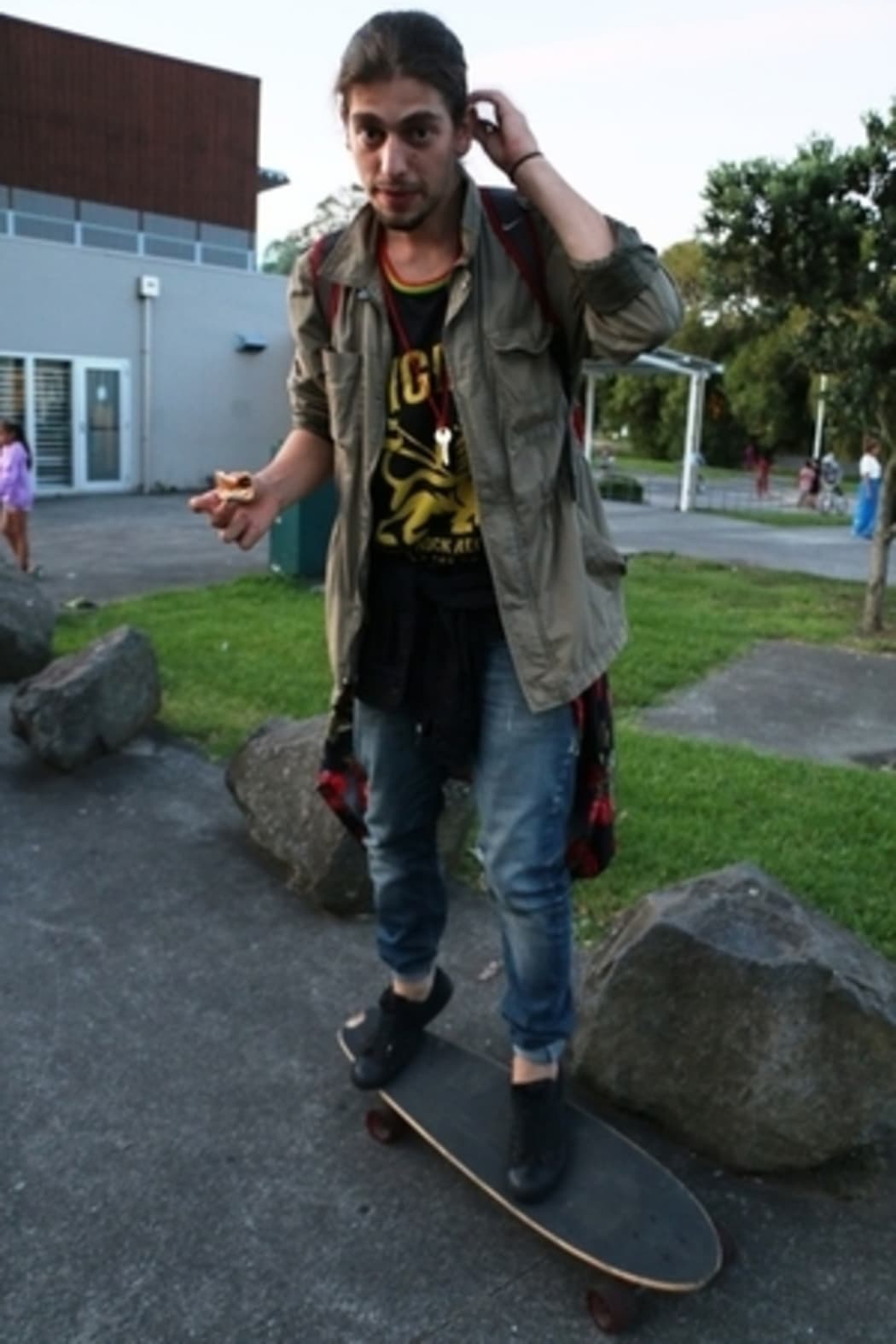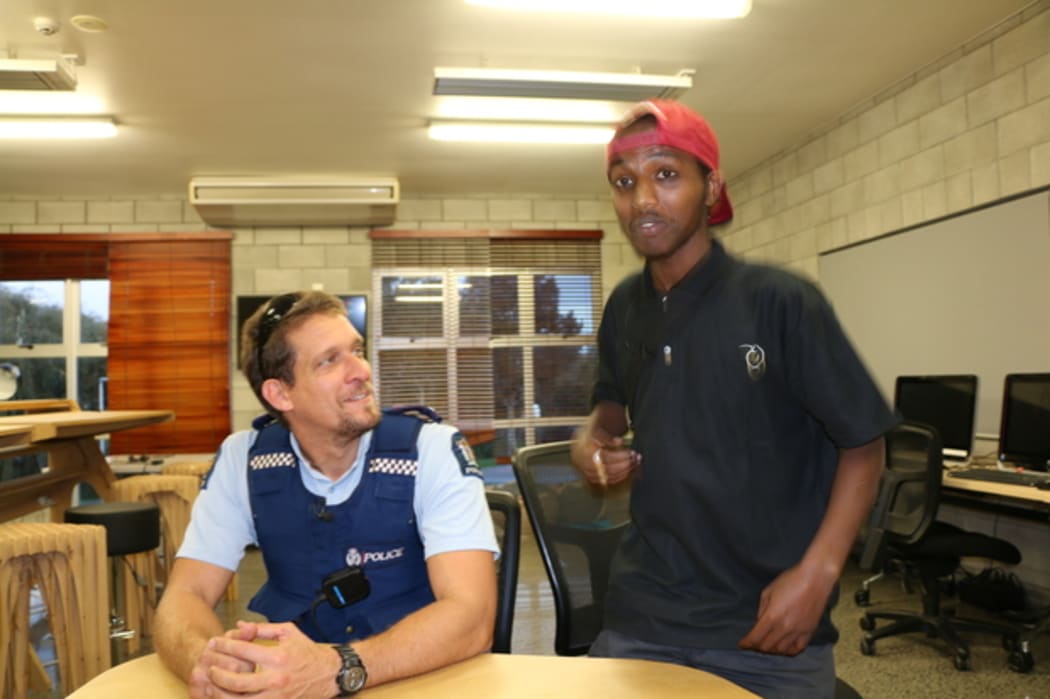Young Africans in Auckland feel the findings of a report into how they're treated by the justice system have been dismissed.
In a small recording studio Mahad Yusef, aka rapper Syco Yusef, performs his song Contemplating. The lyrics paint a picture of a conflicted young man choosing his path in life.
I’m just contemplatin’, yeah my mind be racing, losing concentration, man I must be patient.
“I wrote this song when I was in a place in life where I wanted to do a lot of bad things but I knew the outcome of those bad things,” he says. “It’s a song that got me through that time and pushed me on to be the person I am today.”
Mahad, 21, is a Mt Roskill local and dreams of becoming a counsellor helping youth in his neighbourhood.
“A lot of young teenagers in our neighbourhood are on home detention, bracelets, my friends are in jail … all for misunderstandings, all for little things,” says Mahad.
“All for things that could have been dealt with in the community, without police ...” Mushtaq, 18, and Koolay, 16, agree.
“Who deserves to be 21 and in prison you know?” Mahad adds.
“It’s pretty annoying to be stopped by a police officer just for walking on the road based on how you’re dressed … to see if we have bail conditions, because we’re black.”
Africans are the fastest growing minority population in Auckland and make-up the largest percentage of their community. In the 2013 census 13,464 people identified with an African ethnic group, the majority of which live in Auckland.
The African Youth Forum research report released in February, 2016, deployed a mixed methods research approach containing both qualitative and quantitative methods by the Auckland University of Technology (AUT) featuring 84 respondents and interviews with 32 young Africans aged 16 to 31.
Participants said they'd been racially profiled, harassed and, in some instances, beaten by police.
Mahad is one of those who was interviewed. His family fled civil war in Mogadishu, Somalia, in 1996 when he was 10 months old moving to New Zealand for a better life.
“I’m pure Kiwi, Kiwi pride!” he says, “New Zealand is my home. It’s done so much for me, gave me an education, a stable home. When I came from Africa I had nothing... She (my mother) raised us on her own. My whole life I’ve been on a mission to make my mother proud.”
But he has had some run-ins with the police.
“Physical violence, fighting,” he says. “I don’t mean to be racist but if I got into a fight with a white kid - I’d be the one copping it harder.”
Mahad says he was left to bleed in a police cell overnight after a tooth was knocked out by a security guard in a scuffle. His gap-tooth grin is a reminder.
“The thing that really bothers me is that they make it seem like New Zealand is such a peaceful country and there is no such thing as racism, no such thing as police prejudice, abuse, but there is. It’s real, it’s happening.”
The aim of the report was to highlight issues youth were experiencing and create dialogue with the police. However the negative responses from both the police and public after its release have left the youth who participated were left feeling even more stigmatised.
“If a group of police are targeting our youth it reverberates into the community and into society and the last thing we want is to marginalise this group of people,” principal author of the report Dr Camille Nakhid says.
“Seventy-five percent of our African youth have university degree qualifications and above. At the moment we can reach the youth. We don’t want to push them so far away that it’s hard to get to them.”
Members of the African Youth Forum (AYF) and one of the researchers met at the Wesley Community Centre in Mt Roskill to discuss the negative backlash they experienced after the report’s release. Fatumah Bah, Nunu, and Ali all insist they felt targeted because of their ethnicity.
“I think it’s about colour.” says Nunu, as a young Muslim woman says she’s felt singled out by front-line police when she and her friends are simply enjoying an evening out in public. “How would you feel safe about going back to the police and saying - the police did this to me?”
Twenty-two year-old Ali agrees. A Tunisian African with a fair complexion, he says his dark-skinned friends are questioned when he is not. "I'm a white African and proud of my colour, but when we're on Queen Street and get stopped by police I've noticed I get treated differently than Nunu, I get treated so differently, it's not subtle, you feel it."

Ali from Tunisia says he experiences different treatment from police because of his "European-looking complexion". Photo: Lynda Chanwai-Earle/RNZ
“The whole point of the research report was to start the discussion,” says Researcher Mohamud Mohamed. “The report aimed to address issues and then move forward. It was solution based. Moreover the police were invited to participate in the research and on the panel discussion [at the report’s launch]. It was not meant as a finger pointing exercise.”
“When you look at people in authority condemning what the youth have said, you’ve just made it very unsafe for them,” Dr Nakhid says. “They came forward - they gave their stories and then these same people said these claims are unsubstantiated. How unsafe is this for them?”
It’s a catch-22 situation.
The police can’t investigate without a complaint, but the report’s participants do not trust the police to investigate themselves.
The deputy chief executive of Māori, Pacific and ethnic services, Superintendent Wally Haumaha says everyone has the right to raise issues of safety and it’s important that ethnic communities trust the police.
“If these youth have legitimate claims then I would expect they come directly to the police. If evidence was given we would look further into these allegations. Hence why I [regard] these allegations as unsubstantiated.”
“I have every confidence that the [Independent Police Conduct] Authority sets out to do the right thing. Nobody in the New Zealand Police deliberately goes out to commit any form of abuse. We now have 70 to 100 Ethnic Liaison Officers working across the country, the voice of the communities is reflected through them."
He also defends policing generally saying that the police do not target people based on the colour of their skin and he detests the term racial profiling.
But Fatumata Bah has this to say: "When we dismiss "racial profiling", which is defined as the use of race or ethnicity as grounds for suspecting someone of having committed an offence, we know we have an issue."
The ethnic liaison officers illustrate a way forward for both sides of this conflict developing relationships within the communities that allow bridges of trust to develop.
“I’ve only come across one cop that I like.” Mahad says emphatically. "Constable Rob Stanton. He’s the only one I trust.”
Before working in Mt Roskill, Ethnic Liaison Officer Constable Rob Stanton did two stints of volunteer work in Africa, taught English in Korea and travelled widely throughout China and Southeast Asia.
“If you come from a former-refugee background you might have reason to be fearful of police. Some of these youth have come from countries in Africa where if you complain about police you will go missing and that’s no exaggeration.”

Ethnic Liaison Officer Constable Rob Stanton with Mahad Yusef. Photo: Lynda Chanwai-Earle/RNZ
Members of the Somali community who participated in the report also note the experiences of former refugees might colour their perceptions of police.
“Our youth are not bad kids, you have civil wars and your psyche changes for a lot of things you’ve witnessed,” says Kenadid Siyad.
“Over in Africa, our police officers have guns and AK-47s.You will respect him because you will fear him. In the Middle East there are certain special forces that are allowed to shoot you on sight. So when you compare him to a Kiwi police officer with no gun, coming out with his little notebook - what a joke!”
Mohamed Geele felt some aspects were exaggerated.
“If you’ve come from a country where it’s shoot first and ask questions later then you don’t want to complain about police,” Mohamed Geele says.
“Here it’s assume first and ask questions later. We just got to work on the assumption part.”
A version of this story was first published on RNZ.co.nz.

